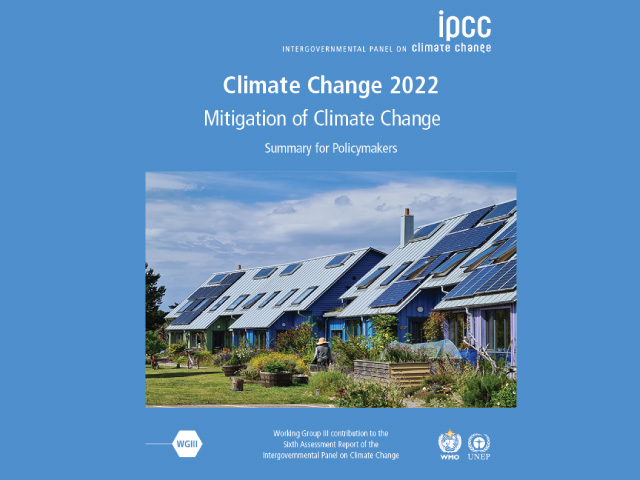The IPCC designates the intergovernmental group for ecology and climate. It was created in 1988 and thus celebrates its 35th anniversary this year. Its ambition is to provide information on climate change, to pool knowledge, but also to limit the impacts of climate change by benefiting from a better understanding of its causes and consequences.
The IPCC now has 195 member countries, i.e. almost all the countries on the planet, which demonstrates its absolutely essential nature, especially in recent years. It is made up of three main working groups.
The IPCC must be careful not to put in place prescriptive policies, but it must nevertheless be cautious of issuing recommendations that are politically applicable, otherwise, its effectiveness will be reduced to nothing.
The IPCC acts at the planetary level, mainly as an observer, having the "real" and scientific knowledge in order to help leaders make their decisions.
The IPCC produces reports on a multi-annual basis at each of its cycles. These are always eagerly awaited, in particular, because they allow environmental protection movements to support their statements using reliable, honest, complete, and detailed scientific bases.
The latest IPCC report was published in 2022, and we will detail its content here.
This report was published on April 4, 2022, and contains, in particular, directives aiming to confirm the Paris Agreement of 2015.
The central objective of these two events is to maintain global warming at 1.5 degrees Celsius and not to exceed this measure. To do this drastic efforts are required because current human activity is leading to a much greater increase in global temperature, and would have dramatic consequences on nature and people.
The 2022 IPCC report, in its third part, therefore, aims to describe potential solutions to be put in place to work in the right direction and successfully limit greenhouse gas emissions. Several solutions are detailed in this third section.
In the first part, published in August 2021, the IPCC sounded the alarm by indicating that climate change was already happening and much faster than what experts had been able to predict in the past. The scientists who participated in the development of the report indicate that the probability of occurrence of natural disasters is increasing very quickly and significantly.
Scientists also insist on the unequivocal role of industrial human activity in global warming.
The IPCC draws everyone's attention to five avenues to explore:
- The absolute need to implement energy sobriety with regard to greenhouse gas emissions
- The profound transformation of lifestyles (significantly reduce the consumption of meat, in favour of vegetable alternatives, improve the energy efficiency of housing, etc.)
- The end of fossil fuels, favouring renewable and natural energies, mainly with regard to solar and wind energy
- The transformation of modes of transport (avoiding long-haul flights, for example, favouring public transport, developing carpooling or car sharing)
- The essential global cooperation in this area, in order to maximise the impacts.
The IPCC insists on the unavoidable need to decarbonise the industry, to transform the efficiency of materials, and also aim for comfort but for processes using fewer raw materials.
The ambition of the IPCC is not to limit progress and efforts to collective initiatives but to anchor these principles in collective mentalities, to make them categorical imperatives that cannot be ignored, particularly for the younger generations.
The IPCC published this report in 2022 and hopes to be able to work for the climate. Meetings and working groups are continuing and are already working on the next IPCC report, which will be published at the end of the next cycle of reflection, work, and research. One thing is certain: the urgency is certain, and the weight of the IPCC strongly influences the political decisions that plan for the world of tomorrow.
SOURCES
Vie-publique.fr - New IPCC report: what solutions to face global warming? | service-public.fr
IPCC climate report: an alarming finding | life-public.fr
I. Presentation and operation of the IPCC
The IPCC operates under the governance of its various member states and is becoming increasingly important as climate-related issues multiply and become more and more popular. Member States approve the reports prepared by the IPCC at annual meetings (or sometimes several times a year).The IPCC now has 195 member countries, i.e. almost all the countries on the planet, which demonstrates its absolutely essential nature, especially in recent years. It is made up of three main working groups.
The IPCC must be careful not to put in place prescriptive policies, but it must nevertheless be cautious of issuing recommendations that are politically applicable, otherwise, its effectiveness will be reduced to nothing.
The IPCC acts at the planetary level, mainly as an observer, having the "real" and scientific knowledge in order to help leaders make their decisions.
II. The 2022 IPCC report
The IPCC produces reports on a multi-annual basis at each of its cycles. These are always eagerly awaited, in particular, because they allow environmental protection movements to support their statements using reliable, honest, complete, and detailed scientific bases.
The latest IPCC report was published in 2022, and we will detail its content here.
This report was published on April 4, 2022, and contains, in particular, directives aiming to confirm the Paris Agreement of 2015.
The central objective of these two events is to maintain global warming at 1.5 degrees Celsius and not to exceed this measure. To do this drastic efforts are required because current human activity is leading to a much greater increase in global temperature, and would have dramatic consequences on nature and people.
The 2022 IPCC report, in its third part, therefore, aims to describe potential solutions to be put in place to work in the right direction and successfully limit greenhouse gas emissions. Several solutions are detailed in this third section.
In the first part, published in August 2021, the IPCC sounded the alarm by indicating that climate change was already happening and much faster than what experts had been able to predict in the past. The scientists who participated in the development of the report indicate that the probability of occurrence of natural disasters is increasing very quickly and significantly.
Scientists also insist on the unequivocal role of industrial human activity in global warming.
III. IPCC 2022 recommendations for decision-makers
Faced with all the constants drawn up in the first two parts of the 2022 IPCC report, the members of the IPCC are issuing recommendations to be put in place quickly in an attempt to limit the disastrous consequences of climate change.The IPCC draws everyone's attention to five avenues to explore:
- The absolute need to implement energy sobriety with regard to greenhouse gas emissions
- The profound transformation of lifestyles (significantly reduce the consumption of meat, in favour of vegetable alternatives, improve the energy efficiency of housing, etc.)
- The end of fossil fuels, favouring renewable and natural energies, mainly with regard to solar and wind energy
- The transformation of modes of transport (avoiding long-haul flights, for example, favouring public transport, developing carpooling or car sharing)
- The essential global cooperation in this area, in order to maximise the impacts.
The IPCC insists on the unavoidable need to decarbonise the industry, to transform the efficiency of materials, and also aim for comfort but for processes using fewer raw materials.
The ambition of the IPCC is not to limit progress and efforts to collective initiatives but to anchor these principles in collective mentalities, to make them categorical imperatives that cannot be ignored, particularly for the younger generations.
The IPCC published this report in 2022 and hopes to be able to work for the climate. Meetings and working groups are continuing and are already working on the next IPCC report, which will be published at the end of the next cycle of reflection, work, and research. One thing is certain: the urgency is certain, and the weight of the IPCC strongly influences the political decisions that plan for the world of tomorrow.
SOURCES
Vie-publique.fr - New IPCC report: what solutions to face global warming? | service-public.fr
IPCC climate report: an alarming finding | life-public.fr












